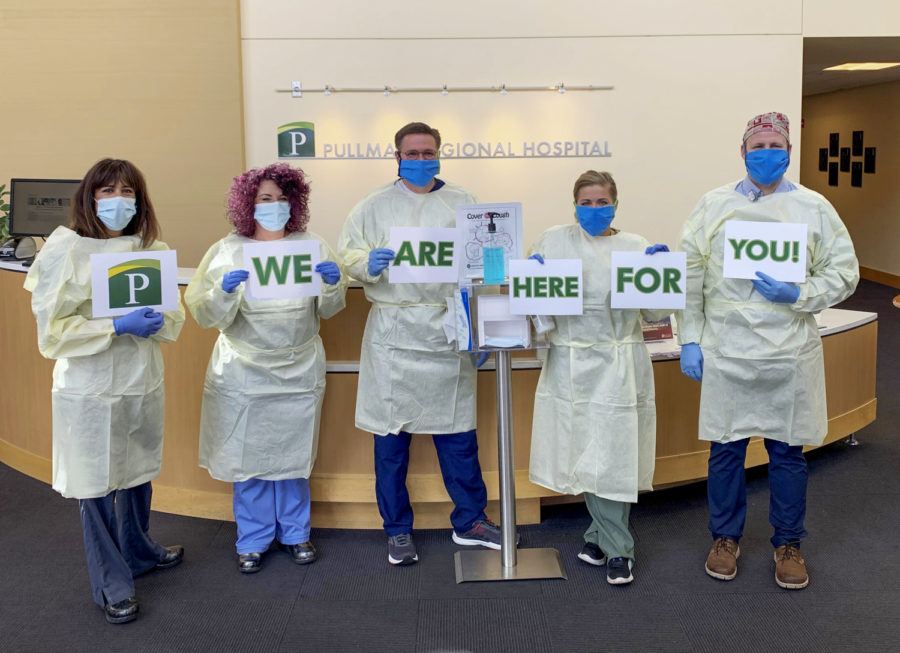PRH nurses reflect on pandemic
Navigating through changing protocols was a struggle; structure of home, work derailed
Hailey Basaraba and Anna Engle, registered nurses at Pullman Regional Hospital, said one of the greatest struggles they have faced is keeping up with the changing protocols within the medical community.
April 1, 2021
The COVID-19 pandemic has made it a difficult year for everyone, but healthcare workers like those at Pullman Regional Hospital have endured extreme levels of stress. Now that the end is in sight, many are still reeling from the stress of the pandemic.
When asked how she was feeling, Hailey Basaraba, night shift ICU registered nurse at PRH, said the question is very loaded. She does not hear that question often, so it takes her aback. She said it is something people need to ask each other more.
Basaraba simply describes the past year as “an experience.”
Anna Engle, ICU and medical unit registered nurse at PRH, likens the past year to a “roller coaster.”
Engle and Basaraba said one of the greatest struggles they have faced is keeping up with the changing protocols within the medical community.
After working in the medical field for 15 years, Engle said she is used to adapting to new changes. However, guidelines changed so quickly during the pandemic that sometimes PRH staff were not aware of the latest updates.
“Information, protocols and processes were constantly changing, so trying to keep up to make sure I provided the best care for my patients was a challenge on top of the normal stresses of caring for sick people,” Basaraba said.
PRH staff did the best they could. Working together, they shared successes, struggles and heartaches, Engle said.
“Luckily we live in a very supportive community and we saw and felt that throughout the pandemic,” she said.
The structure of home life for those in the medical field also changed drastically. Basaraba said the flow of her work, home and social life was derailed.
Worried about protecting her family, Basaraba said she had to get creative when it came to transitioning from the hospital to the home environment. At the beginning of the pandemic, her routine involved a “dorm-like” situation with a separate bathroom, bedroom and eating area.
Engle also had a similar routine.
“Depending on the day or night you had … some of us would strip down in the garage and walk right past our families to go shower and wash the day away,” Engle said.
Sometimes it could be exhausting to come home after a demanding shift at work to a family that missed you, Engle said.
“Other times, coming home and kissing your family was just what you needed to remember the masks and social distancing are working — not everyone is sick,” Engle said.
With Engle and her husband working full time with three kids at home, she said they employed teamwork with fellow coworkers to meet the needs of their families and work schedules.
Engle said the past year has been a whirlwind for her at work and home. She could not have gotten through the past year without support from friends and coworkers.
As the severity of the pandemic has lessened since the release of the COVID-19 vaccine, healthcare workers are finally able to process the events of the past year.
“I’m better than I was, but I’m still working on feeling myself again,” Basaraba said. “This year was mentally challenging and has shown me how much mental health can affect your physical health.”
While she is relieved to have a vaccine, Engle said she will never forget the most challenging days, weeks and months of this pandemic.
“[I will remember] the patients we lost, the patients that healed and the heartache of families not being able to see their loved ones [in person] while they were hospitalized,” Engle said.
Basaraba said this time has been stressful for her, but she is also always considering how her patients are doing.
She said she can not imagine the stress of the patients. Patients are going through some of their toughest times and she is unable to show them her smile anymore.
“I’m acting as their friends and family,” she said, “but they don’t even know me or see my face.”
The important thing is to stay safe and check on friends and family, Basaraba said.
As the end of the pandemic is on the horizon, Engle said kindness goes a long way during these times.
“Give us a little grace,” she said. “I think we forget we are all struggling.”











